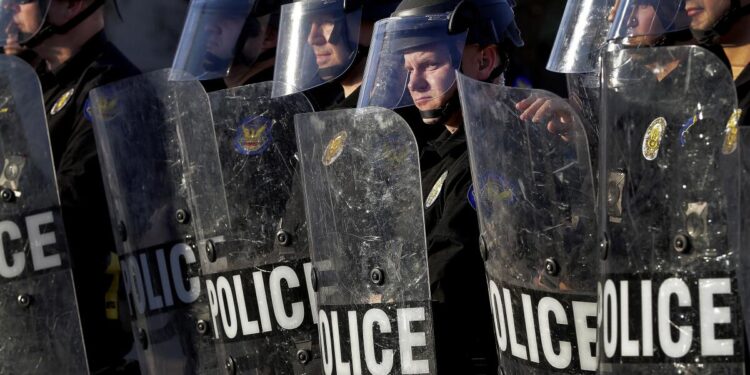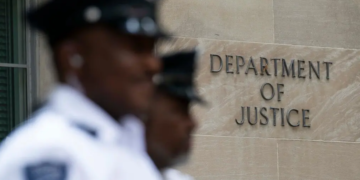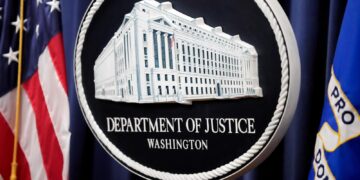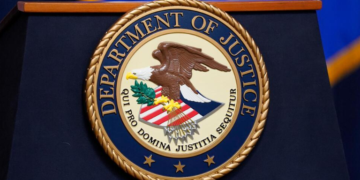Phoenix police form a line during demonstrations following the death of George Floyd four years ago. The U.S. Justice Department has reported that Phoenix police violate rights, discriminate against Black, Latino, and Native American individuals, and use excessive force. (Matt York / Associated Press)
June 13, 2024 Story by: Editor
The Phoenix Police Department has been found to engage in excessive force, violate constitutional rights, particularly those of homeless individuals, and discriminate against Black, Hispanic, and Native American communities. This is according to an investigation by the Justice Department, the results of which were released on Thursday.
The Justice Department identified a “pattern or practice” of violations, noting that Phoenix police often stop, detain, and arrest homeless individuals without reasonable suspicion of criminal activity. Furthermore, the city and its police force seize and destroy the belongings of homeless people without proper notice or the chance to reclaim their property, the report stated.
Assistant Attorney General Kristen Clarke, who leads the Justice Department’s Civil Rights Division, announced the findings.
“This finding is historic,” Clarke remarked. “This marks the first time that the Justice Department has found violations of the civil and constitutional rights of people who are homeless.”
The investigation’s conclusions are compiled in a 126-page report issued Thursday.
Read the full report here.
The police department directed inquiries regarding the findings to the city. Mayor Kate Gallego acknowledged receiving the report at the same time as the public.
“The City Council will meet this month — in Executive Session on June 25 — to receive legal advice, better understand the report, and discuss next steps,” Gallego said in a statement. “I will carefully and thoroughly review the findings before making further comment.”
Clarke noted that homelessness is a significant issue in Phoenix, mirroring a national trend, with the city’s homeless population nearly tripling over the last decade.
“Overpolicing of the homeless has become a central pillar of the police department’s enforcement strategy,” she said. “In fact, 37% of all of the department’s misdemeanor arrests and citations were of homeless people.”
She emphasized that such actions are not only illegal but also disrespect the humanity and dignity of society’s most vulnerable members.
Additionally, Clarke highlighted the discrimination against Black, Hispanic, and Native American communities in law enforcement practices. For example, Black drivers in Phoenix are 144 times more likely than white drivers to be arrested or cited for minor moving violations, and Hispanic drivers are 40% more likely.
“Phoenix police also enforce drug and alcohol offenses more severely against Black, Hispanic, and Native American people than against white people,” Clarke said.
Data shows that Phoenix cites and arrests Black individuals for marijuana possession at nearly seven times the rate of white individuals, and Hispanic people more than three times the rate. Similarly, Black, Hispanic, and Native American people face disproportionate charges for pedestrian traffic violations and loitering, the report found.
Clarke criticized the police department for treating children the same as adults, which she said damages trust in law enforcement among the next generation of Phoenix residents.
She also pointed out instances of retaliatory policing against individuals engaged in protected speech. Clarke referenced a protest where officers used tear gas against peaceful demonstrators and subsequently circulated a challenge coin depicting a protester shot in the groin, reported by KNXV-TV of Phoenix.
“This challenge coin instead depicted a protester whom an officer shot in the groin with a 40-millimeter impact round,” Clarke said.
The coin displayed during her Zoom news conference featured a star over the man’s groin with the phrase: “Good night, left nut.”
“When police officers abuse their power to silence people asserting their constitutional right to free speech and assembly, it erodes the community’s trust in law enforcement,” Clarke stated.
The city and police department also discriminate against individuals with behavioral health disabilities during dispatch calls and crisis responses. Clarke cited city experts estimating that 10% of monthly dispatch calls relate to behavioral health, with officers often escalating encounters instead of providing appropriate assistance.
“The police department claims it was unaware of these significant racial disparities, but long-standing community concerns about discriminatory policing should have spurred the department to analyze its own data,” Clarke said. “Instead, the police department turned a blind eye to the data, ignored these unmistakable warnings, and failed to uncover their own discriminatory practices.”
Throughout the investigation, Clarke noted, the city and its police department have initiated some reforms, such as revising use-of-force policies, introducing de-escalation training, and increasing resources for the homeless population. Despite these efforts, Clarke stated that many reforms are still not implemented or exist only on paper.
“These efforts are simply not enough to address the full scope of our findings today,” Clarke added.
The investigation involved extensive interviews, police ride-alongs, document reviews, and body-worn camera footage analysis.
“The findings that we have issued are severe,” Clarke said, concluding, “This is one instance where we can’t count on the police to police themselves.”
The Justice Department’s civil rights investigation into the Phoenix Police Department began in 2021 following a series of officer-involved shootings and abuse complaints. Unlike other cities, this investigation wasn’t triggered by a single incident. Attorney General Merrick Garland emphasized that such investigations aim to enhance public trust and safety by identifying systemic issues.
Clarke stated that the Justice Department will collaborate with the city to find solutions, stopping short of confirming a consent decree, which is typically used to enforce changes within governmental agencies when misconduct is found. Phoenix officials have opposed this prospect, but Clarke pointed to cities like Baltimore, Seattle, and Albuquerque, where consent decrees have led to reform and progress. Source: NBC News

















